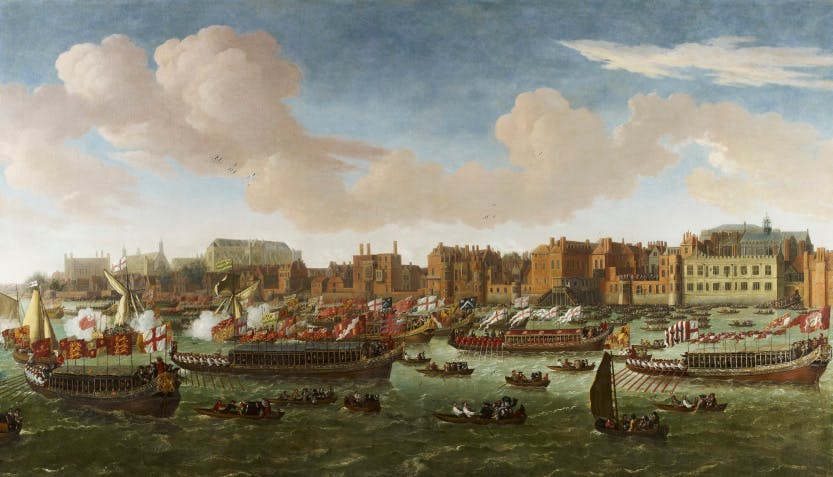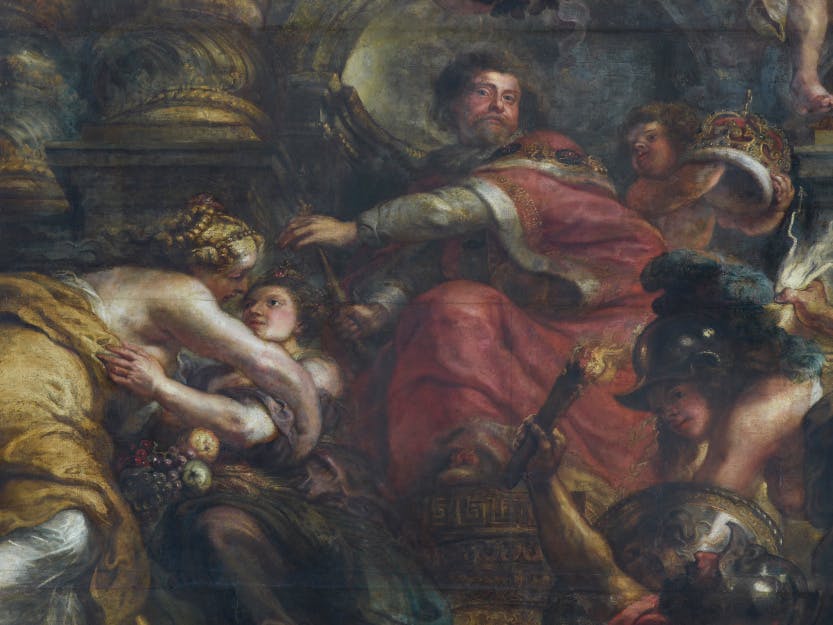Now I will believe that there are unicorns: The Tempest at Whitehall Palace
Date: 01 November 2021
Author:
Brett Dolman1 November 1611 was the first recorded performance of William Shakespeare's The Tempest. Curator Brett Dolman reflects on the Jacobean court setting in which it was first performed and how its themes reflect the ambitions and fears of James I's reign.
"All hail, great master! Grave Sir, hail! I come To answer thy best pleasure; be't to fly, To swim, to dive into the fire, to ride On the curled clouds, to thy strong bidding task Ariel and all his quality."
[The Tempest, Act 1, Scene 2]
When William Shakespeare arrived at Whitehall Palace at the end of October 1611, accompanied by his acting troupe, the King's Men, he was in his late forties and looking back on almost a decade of royal service for James I. Almost 40 of his plays had been successfully performed on the public stage and in front of royal palace audiences, where they provided an important, carefully pitched, contribution to the drama, spectacle and propaganda of the early Stuart court.
The King's Men were usually contracted to provide entertainment for the royal family and their assembled guests - drawn from the higher ranks of society and visiting dignitaries - for the whole winter season. Between Halloween 1611 and the following spring, the King's Men staged 23 plays at Whitehall, including what is the first recorded production of one of Shakespeare's new compositions, The Tempest, performed on Hallowmass - the day after Hallow's Eve - the 1st of November.
Betrayal, revenge and family...
The Tempest is a tale of betrayal, revenge and family. Prospero, the rightful Duke of Milan, has been deposed and exiled to a strange, enchanted island, with his daughter Miranda. There, Prospero deals in magic, assisted by his two servants, the monster Caliban and the spirit Ariel. One stormy night, Prospero and Ariel conjure a tempest to wreck a ship carrying the usurping Duke Antonio (Prospero's brother) and a host of other characters, good and bad, tragic and comic. Washed up on the island, these hapless souls endure temptations and torments, and are forced to interrogate their consciences. Pure and dark hearts are revealed, Prospero eventually reclaims his dukedom, and Miranda is married to Ferdinand, the son of Alonso, King of Naples. There are cameo appearances of ancient Greek goddesses and assorted 'nymphs and reapers'.
This is a play that is mysterious, beguiling and difficult (both to stage and to decipher) but it has a special meaning for me. In a previous life as a a poor player, that struts and frets his hour upon the stage, I managed to play the character of Ariel twice: I can still remember most of the lines. In the first, I was one of a trio of singing Ariels, all Full Fathom Five and Where the Bee Sucks; in the second, I had to make all my entrances from a ladder hanging dangerously from the fly loft. Reviews were mixed!
Back at the early Stuart court, Shakespeare's plays were enjoyed both as diverting entertainment and watched more critically for their political and social subtexts. The Tempest might have been filed by the Revels Office - the royal department charged with organising court festivities - under 'comedy-drama' for repeat performances, but the King's playwright was also concerned with raising the issues of the day, and subtly (and sometimes more obviously) advertising the great wisdom and authority of James I in dealing with them.
James I: an enigmatic patron
As a king, James was a paradox. Lampooned by opponents as a vulgar, corrupt and paranoid monarch presiding over a drunken, debauched court, he was also a 'rex pacificus', determined on establishing a peaceful kingdom freed from debilitating war with Spain, and a 'living library' who wrote essays for his son on the art of kingship, and presided over the Hampton Court Conference of 1604, aiming to bring an end, finally, to decades of religious conflict.
"How beauteous mankind is! O brave new world, That has such people in't!"
[The Tempest, Act 5, Scene 1]
Imperial Ambitions
James I's new Kingdom of 'Great Britain' (a phrase the King himself used) was also stretching its wings and looking overseas, the beginning of the journey toward Empire that would reach its apogee two centuries later. The first, lasting, English settlement in America had been established at Jamestown in 1607, and British colonists arrived in Bermuda in 1609. The Tempest is a play loaded with visions and descriptions of such brave new worlds, of untrodden beaches where the printless foot flies across the yellow sand underneath a sky full of noises, Sounds and sweet airs, that give delight and hurt not. For Gonzalo, a wise old counsellor to King Alonso, Prospero's island offered an opportunity to establish a new Eden, without treason, felony, sword, pike, knife or gun. Colonisation was expensive and needed investment from the kinds of well-endowed pockets present in Shakespeare's audience at Whitehall.
"Hell is empty, And all the devils are here."
[The Tempest, Act 1, Scene 2]
At the same time, the darkness of the island's 'uncivilised' past, ruled over by a witch called Sycorax, the mother of the deformed Caliban, is presented as a justification for the overlordship of Prospero. It also hints at the kind of partisan justification used for the colonisation of already inhabited lands that would become more familiar as the century progressed. King James had a particular loathing and fear of witches, imagined to be a very real presence in early Stuart England. Prospero, on the other hand, is a good magician, perhaps better described as a virtuous king aided by divinely sanctioned powers; under his rule, Caliban's rebellion is quashed, and Ariel - the 'good slave' - is finally rewarded with his freedom.
Dynastic Security and Crisis
The Tempest is ultimately a play about the right to rule, the evil of usurping power, and the importance of ensuring a dynastic legacy. These were very real and present issues in the early 1600s. James I was the first Stuart king, more-or-less selected by his childless predecessor Elizabeth I as the best available Protestant candidate. His supremacy was occasionally challenged, at home and abroad by Catholic conspirators, foreign powers, and supporters of alternative monarchs, like his cousin Lady Arbella Stuart.
Arbella's story could almost have been lifted from one of Shakespeare's tragic-comic plots. In 1610, frustrated with the King's controlling paranoia, keeping her at court and refusing to let her marry, she secretly wed William Seymour, Lord Beauchamp (who was also a descendant, like Arbella, of one of Henry VIII's sisters). The King discovered the liaison and imprisoned them, only for both to escape: Seymour fled abroad, but Arbella - disguised as a man, complete with wig, russet boots and rapier - was recaptured, sent to the Tower, and would die there in 1615.
"Honour, riches, marriage-blessing, Long continuance, and increasing, Hourly joys be still upon you!"
[The Tempest, Act 4, Scene 1]
While shutting the door to alternative bloodlines, King James was also concerned with ensuring his own. In 1612, he betrothed his 16-year-old daughter Elizabeth to the teenaged Frederick V, the Elector Palatine (an area of the Holy Roman Empire in modern Germany). Frederick arrived in England in October and the King's Men were once more booked to entertain the royal court over Christmas and through to the marriage celebrations of February 1613. The Tempest was again staged during these festivities and, this time, the play reverberated with messages about matrimony. The masque at the end of Act 4, which may have been specially inserted into the 1612 production, allows James (as Prospero) to instruct Elizabeth (as Miranda) on the virtues and duties of marriage. Wider implications were important too: the durability of the Stuart dynasty at a time of crisis - the King's popular eldest son, Prince Henry, had died in October 1612 aged eighteen - while James was also busy on promoting the benefits of the political marriage of England and Scotland.
Image: Lady Arbella Stuart, a later print produced from a portrait by Paul van Somer, c1605. Royal Collection Trust / © Her Majesty Queen Elizabeth II 2021

Art Imitates Life
The Tempest is one of Shakespeare's last plays, and arguably the whole text may be a kind of celebration for the 'potent art' of the theatre. Shakespeare is Prospero, the playwright as magician, who has perfected his craft after years of long study and experience (Prospero had been exiled on his island for 12 years). So too the art of kingship, which James I would have agreed requires study and due diligence to perfect. Yet there is a warning here too, right at the very end of the play, of the ephemerality of power and splendour, that ultimately the theatrical magic conjured by Shakespeare is an illusion, and that even kings and princes must account for their actions to God.
"Gentle breath of yours my sails Must fill, or else my project fails, Which was to please. Now I want Spirits to enforce, art to enchant, And my ending is despair, Unless I be relieved by prayer, Which pierces so that it assaults Mercy itself and frees all faults. As you from crimes would pardoned be, Let your indulgence set me free."
[The Tempest, Act 5, Scene 1]
As I said at the beginning of this particularly wordy blog (apologies, Shakespeare is infectious), The Tempest is a difficult and complicated play. I look forward to my third attempt, although I am now far too old to be cast as Ariel.
Brett Dolman
Curator, Collections Historic Royal Palaces
More from our blog

400 Years of William Shakespeare at Hampton Court
06 November 2023
On 8 November 1623, John Heminges and Henry Condell, completed the collected works of William Shakespeare – now known as the ‘First Folio’. Here, we explore how this period was brought to life at Hampton Court Palace this summer, using research into the playwright’s palace connections.

Charles II's Coronation Procession from the Tower of London
24 April 2023
Curator of Historic Buildings, Alden Gregory, takes a look at Charles II's Coronation - the last coronation in which the Tower of London played a starring role.

Frances Stuart and Barbara Villiers
10 February 2023
Learn about the relationship between Frances Stuart and Barbara Villiers, two of the most influential women at the court of King Charles II.



